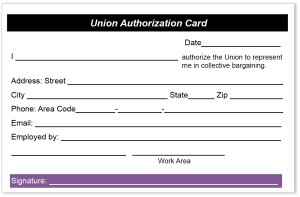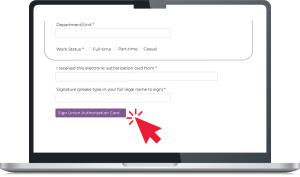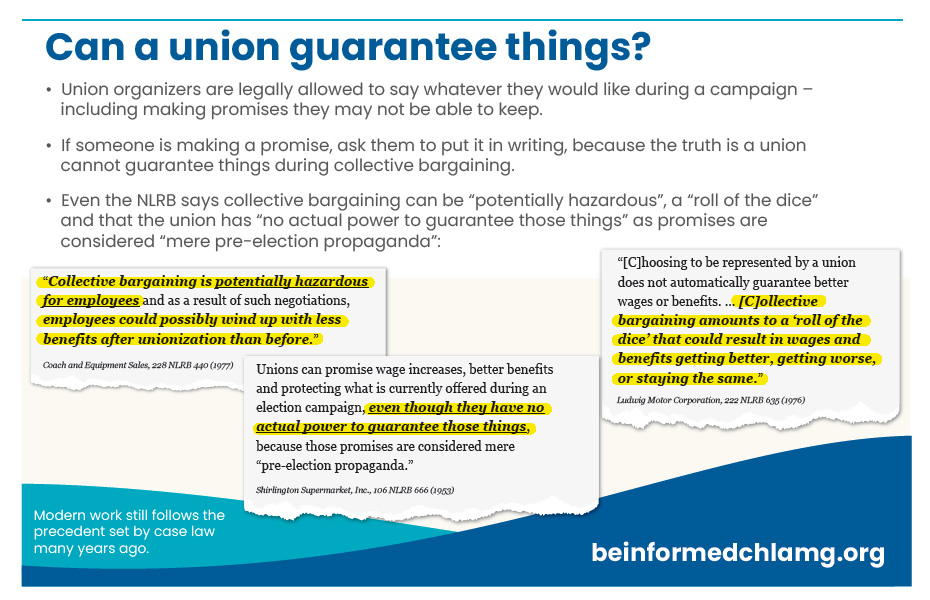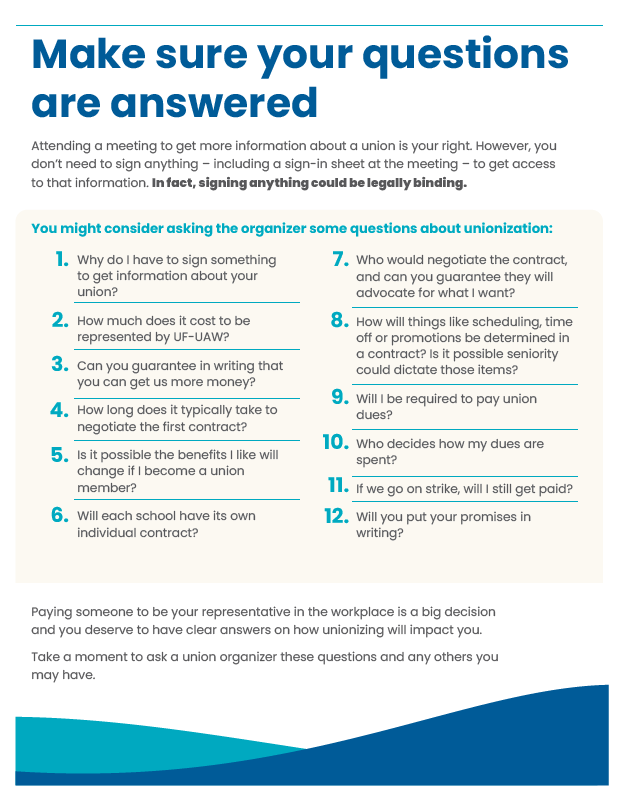Welcome
This is a space where you can learn about unionization, including dues, collective bargaining, how unions operate, and how being part of a union could affect you personally. Ask questions and get the information you need to make a decision about whether unionization is right for you.
Your signature holds value
Whether signing off on prescriptions or putting your name on research, your signature holds value.
Unions use authorization cards to gather signatures from the bargaining unit – or group of employees – they are trying to organize.
Authorization cards can be paper cards, petitions, or online forms.



Questions You Can Ask a Union Organizer
Signing any form of union authorization card indicates you want the union to be your exclusive representative at work and can be legally binding. So, before you sign, consider asking:
- Why do I have to sign something to get information about your union?
- How much does it cost to be represented by the union?
- Will the union guarantee in writing that it can get us more money?
- How long does it take to negotiate the first contract?
- Is it possible that the benefits I like will change if I become a union member?
- Will each specialty have its own contract?
- Who would negotiate the contract, and can you guarantee that they will advocate for what all of the faculty want?
- How will things like scheduling, time off, hybrid work, and promotions be determined in a contract? Could seniority be a factor dictating those items?
- Will I be required to pay union dues?
- Who decides how my dues are spent?
- If there is a strike, will I get paid?
- Will you put your promises in writing?
FAQs
Union Authorization Cards
A union card or petition is a legal document that can give a union the sole and exclusive right to speak and act on behalf of team members in all matters regarding wages, benefits, working conditions and other terms of employment.
No. Signing a card does not guarantee that you will get anything more or that issues will be resolved. If the union becomes your excusive representative, the only right the union has is to represent team members and try to negotiate a contract with USC. USC does not have to agree to union demands and there is no requirement that a labor contract agreement be reached.
The union can do several things with a signed authorization card/petition.
- The union may use this card to send you mail, text you or call or visit you at your home.
- If the union gets 30% of team members in a targeted group to sign cards, it could request that the National Labor Relations Board (NLRB) conduct an election in which team members vote to determine whether or not they want to be unionized.
- If the union gets 50%+1 of team members in a targeted group to sign cards, it can demand recognition from the employer or request the NLRB conduct an election in which team members vote to determine whether or not they want to be unionized. Following a demand for recognition, an employer has three options:
- The employer can file for an election with the NLRB.
- The employer can request a card check, which is a process where a neutral third party would verify the union has the support via signed authorization cards it says it has. If the union is found the have enough signed cards, it would be recognized without an NLRB election.
- The employer can accept the demand for recognition, and the union would immediately begin representing the team members in the proposed bargaining unit without an NLRB election.
No. But signing a card may have significant consequences. If the union is able to gather enough support to file a petition with the National Labor Relations Board to trigger an election, every eligible team member in the petitioned-for group will have the right to participate in the vote. Or, if the union gathers enough signatures to demand recognition, it’s possible a union could be accepted without you having the chance to vote.
Union organizers and team members who support them, can be persistent You have the right not to sign a union card—the choice is yours
No. You should not be expected to sign a legally binding document or any other union materials just to get information. You have the right to say, “No thanks.” You can get more information about the union from reading other sources, talking with your faculty leader, or Human Resources.
Generally, a signed union authorization card is valid for 12-months, but there is not a hard rule around this timeframe. It’s also important to remember a union is under no obligation to give a card back once it’s been signed.
If you previously signed a union authorization card, you can let the union know you would like it back. The best way to do so is through a written communication to the union. Make sure you keep a copy of your request, for your records. Here is what you could say:
I do not wish to be represented by United Faculty – United Auto Workers (UF-UAW). I hereby revoke any authorization card or other document I signed which might reflect otherwise. Please return the original of any documents UF-UAW has in its possession which were signed by me.
Keep in mind, it is up to the union to decide whether to return a signed card; there is no requirement or obligation to give it back.
Yes, whether you physically sign a paper union authorization card or complete information online and click a button to submit, your signature can be legally binding. If the union has enough signed authorization cards, it will use them to file a petition for election with the National Labor Relations Board or demand recognition from an employer.
It doesn’t work that way. If you are included in the bargaining unit and the union is voted in, the union will become your exclusive bargaining representative – whether or not you voted – and regardless of how you voted. The union would also be the exclusive bargaining representative for future USC non-tenured faculty whose programs or departments are in the bargaining unit, even though they did not have a chance to vote.
Ask a Question
If you have questions about unionization, submit them here! All submissions are anonymous, but if you wish to receive a direct reply, please include your contact information.




